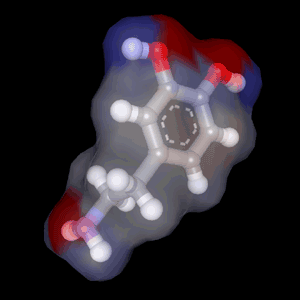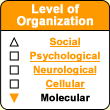|
|
|
|
Dopamine is a chemical messenger (neurotransmitter)
that is not very common in the brain. Scarcely more than 0.3% of
the neurons in the brain produce dopamine. Nevertheless, these
neurons play an essential role in many of our behaviours.

|
Model
of a dopamine molecule |
For example, they are involved in controlling
the body’s
movements. When some of these neurons are destroyed, the person
displays the trembling characteristic of Parkinson’s disease.
The opposite problem–too much dopamine in certain regions
of the brain–produces the terrible symptoms associated with
schizophrenia. In fact, the most effective medications for treating
schizophrenia are those that prevent dopamine from binding to dopamine
receptors.
Lastly, certain dopamine-producing neurons, such as those discussed
here, come into play when the person or animal in question experiences
desire or pleasure.
This association between our reward-seeking
behaviours and dopamine is one of the most interesting discoveries
of the 1990s. The more we learn about the properties
of this molecule, the more we begin to perceive the
complex yet essential role that it plays in all dependencies.
|
|





